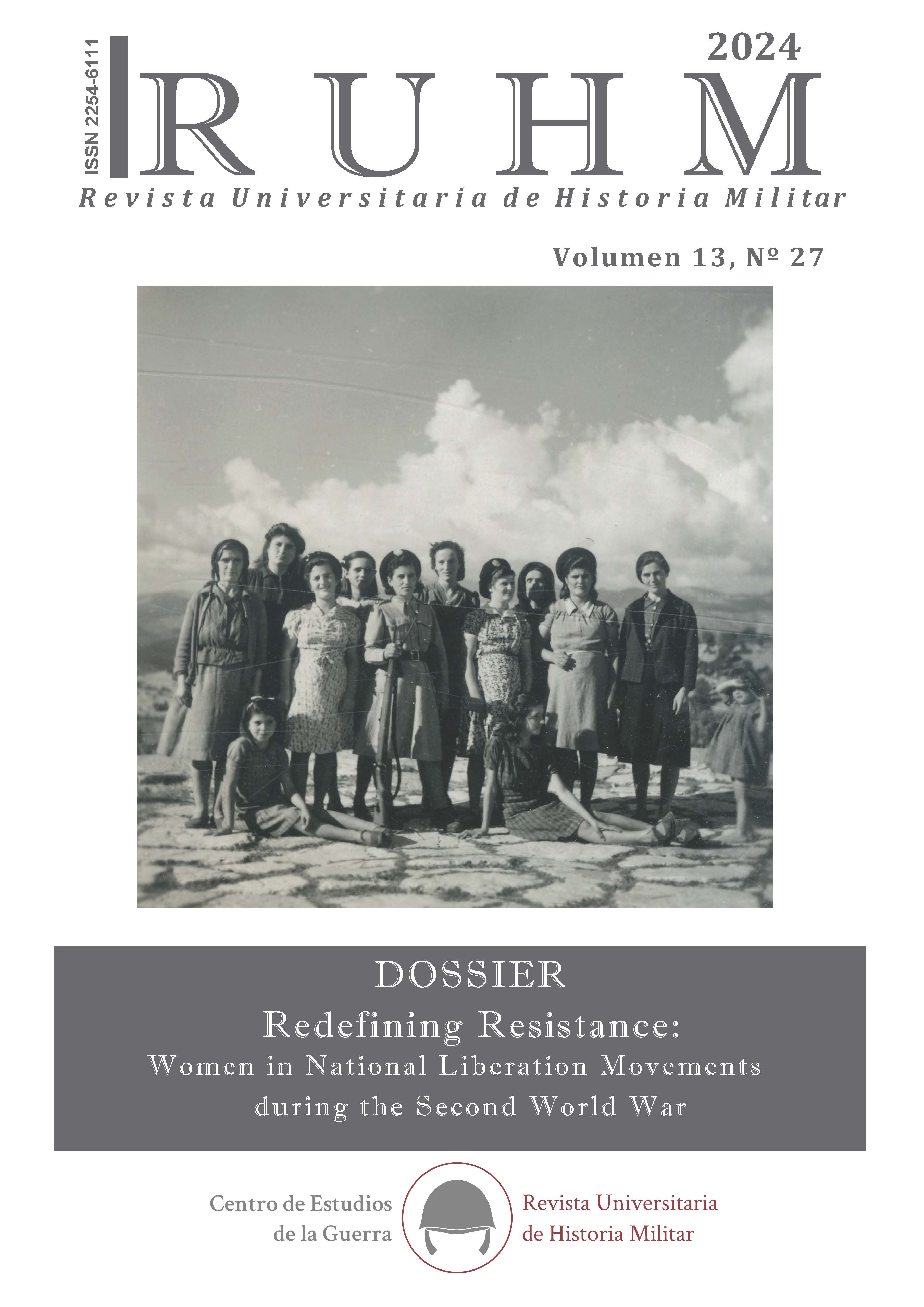Empoderadas pero Limitadas: El Papel y la Agencia de las Mujeres Griegas en el Movimiento de Resistencia (1941-1944)
DOI:
https://doi.org/10.53351/ty5hw653Palabras clave:
Grecia, Mujeres, ocupación, resistencia, Segunda Guerra MundialResumen
Durante la Segunda Guerra Mundial (1941–1944) y la triple ocupación de Grecia, las mujeres ingresaron en la esfera pública de una manera sin precedentes, a pesar de carecer de derechos políticos. La mayoría se unió o apoyó al Frente de Liberación Nacional (EAM), que combinaba la lucha por la liberación nacional con una visión de mayor igualdad. Inicialmente, las mujeres expandieron sus roles tradicionales hacia la defensa pública, liderando manifestaciones masivas y brindando apoyo crucial al Ejército Popular de Liberación de Grecia (ELAS). En las zonas rurales, el trabajo de las mujeres fue vital para la Grecia Libre, donde obtuvieron derechos de voto y ocuparon cargos de liderazgo local. Organizaciones como Solidaridad Nacional y la Joven Mujer Libre movilizaron a las mujeres para brindar apoyo. Sin embargo, las duras condiciones de la ocupación y las ideologías patriarcales limitaron su papel en las organizaciones de resistencia, mientras que los colaboradores les infligieron una crueldad extrema. Tras la liberación en 1944, la derrota del EAM/ELAS en Atenas desató el Terror Blanco, que se enfocó en mujeres que habían liderado o luchado en la resistencia. Aquellas que se negaron a renunciar a sus acciones enfrentaron tortura, exilio o ejecución. La recuperación social fue aún más interrumpida por la dictadura (1967–1974). Solo después de 1974, en la Tercera República Griega, las mujeres de la resistencia pudieron contar sus historias y preservar su legado para las generaciones futuras.
Descargas
Referencias
Aylin AKRINAR: 2003. “The Honour/Shame Complex Revisited: Violence Against Women in the Migration Context”, Women’s Studies International Forum, 26 (2003), pp. 425-442.
Nickos ALIVIZATOS: “Regime of ‘emergency’ and political freedoms, 1946-1949” in Jhon O. IATRIDES (ed.), Greece in the 1940s. A Nation in Crisis, Hanover and London, University Press of New England, 1981. [Greek Edition: Athens, Themelio, 1984, pp. 383-398.
Petros ANTAIOS: Contribution to the History of the EPON, vol. B, Athens, Kastaniotis Publications, 1977. [in Greek]
Berit ÅS: “A Materialistic View of Men’s and Women’s Attitudes towards War”, Women's Studies International Forum, 5:3/4 (1982), Pergamon, pp. 355–364.
Susan BROWNMILLER: Against our Will: Men, Women and Rape, New York, A Bantam Book, 1975.
Maria BRUZZONE: “Women in the Italian Resistance”, in Thompson Paul (ed.), Our Common History: The Transformation of Europe, London, Pluto Press, 1982, pp. 273-310.
Doris E. BUSS: “Rethinking Rape as a Weapon of War”, Feminist Legal Studies, 17 (2009), 145-163.
Judith BUTLER: Gender Trouble: Feminism and the Subversion of Identity, New York, Routledge, 1990.
John Kennedy CAMPBELL: “Traditional Values and Continuities in Greek Society”, in Richard CLOGG (ed.), Greece in the 1980s, University of London, 1983, pp. 184–207.
John Kennedy CAMPBELL & SHERRARD Philip: Modern Greece, New York, Praeger, 1968.
Nicole A. DOMBROWSKI: Women and War in the Twentieth Century: Enlisted with or without Consent. Routledge, 2004.
Juliet DU BOULAY: “Lies, Mockery and Family Integrity” in Peristriany I. G. (ed.), Mediterranean Family Structures, Cambridge University Press, 1976, p. 389-406.
Claire DUCHEN: “Crime and Punishment in Liberated France: The Case of les femmes tondues” in Claire DUCHEN & Irene BANDHAUER-SCHOFFMANN (eds), When the War was Over. Women, War and Peace in Europe, 1940-1956, London and New York, Leicester University Press, 2000, 233-250.
EAM: Songs of Resistance and Civil War, Athens, Ellinika Themata 15, n.d. [in Greek]
Chrysos EVELPIDIS: The Agriculture of Greece, Athens, O Logos Publications, 1944. [in Greek]
Silvia FEDERICI: Caliban and the Witch, New York, Autonomedia, 2004.
Aliki GIOTOPOULOU-MARAGKOPOULOU: “Avra Theodoropoulou as a Person”, O Agonas tis Gynaikas [The Woman’s Struggle], 2 (1964), pp. 24-26. [in Greek]
Vassilis GOUNARIS: Of Known Social Beliefs. Social and Other Aspects of Anti-communism in Macedonia during the Civil War (1945-1949), Thessaloniki, Paratiritis, 2002. [in Greek]
Evanthis HATZIVASILEIOU: PEAN (1941-1945). Panhellenic Union of Fighting Youths, Athens, Association for the Dissemination of Useful Books, 2004. [in Greek]
Eric J. HOBSBAWM & Marion CUMMING: Age of Extremes: The Short Twentieth Century, 1914-1991, London, Abacus, 1995. [Greek Edition: Trans: Κapetangiannis V., Athens, Themelio, 1999].
Efrosini KAFETZI: The Role and Contribution of Women in Greece in the Turbulent 1940s, unpublished master’s thesis, University of Peloponnese, 2023. [in Greek]
Vaggelis KARAMANOLAKIS: The Unwanted Past: The Social Morality Files of the 20th Century and their Destruction, Athens, Themelio 2019. [in Greek]
Maria KARRA: “The Demonstration Against the Bulgarian Descent into Macedonia” in Women in Resistance, Athens, Publication of the Movement The Woman in Resistance, 1982, pp. 73-79. [in Greek]
Dimitris KATSIKAS: “The Politics of Youth in the Metaxas Regime”, International Journal of Balkan Studies, 15/2, (2009), pp. 145-162.
Nitsa KOLIOU: Unknown aspects of Occupation and Resistance 1941-44: Historical research for the Prefecture of Magnesia, vol. II, Volos, n.p., 1985. [in Greek]
Hara KOUKI: “Women and the Greek Resistance: The Role of Women in the Anti-Fascist Struggle in Greece (1941-1944)”, Journal of Modern Greek Studies, 23/1 (2005), pp. 1-25.
Hara KOUKI: “The Role of Women in the Metaxas Regime: Gender and National Identity”, Feminist Review, 89/1 (2008), pp. 45-62.
Hara KOUKI: “Gender and War in Greece: The Impact of the Second World War on Women’s Roles”, Gender & History, 20/3 (2008), pp. 345-362.
Dimitris KOUTOUPIS: “Women in the Greek Resistance: A Study of Gender and Memory”, Feminist Review, 89/1 (2008), pp. 45-62.
Gerda LERNER: The Majority finds its Past: Placing Women in History, Oxford, Oxford University Press, 1979.
Spyros LINARDATOS: August 4, Athens, Themelio, 1966. [in Greek]
Spyros MELETZIS: With the Partisans in the Mountains, Athens, n.p., 1984. [in Greek]
Vassilis PAPADOPOULOS: “The Role of Women in the Greek Resistance: A Historical Analysis”, Social History, 34/3 (2009), pp. 345-362.
Efthymia PAPASPYROY – KARADIMITRIOY: The Epic of the 40s. Folk Iconography, Athens, Historical and Ethnological Society of Greece, 1987. [in Greek]
Ilias PAPASTERGIOOPOULOS: Morias in Arms, Athens, Publications Research and Critique of Modern Greek History, 1975. [in Greek]
Claudio PAVONE: A Civil War. A History of the Italian Resistance (Trans: Peter Levy with the assistance of David Broder; introduced by Stanislao G. Pugliese). London, New York, Verso, 2013.
Leila J. RUPP: “Mother of the ‘Volk’: The Image of Women in Nazi Ideology”, Signs: Journal of Women in Culture and Society, 3:2 (1977), pp. 362-379.
Vassilis ROTAS: The Struggle in the Greek Mountains: V. Rotas in the 1940s-1950s, Athens, n.p., 1982. [in Greek]
R. Z. [Roula Zaxariadi]: “The 1st Panhellenic Conference of the PDEG”, Democratic Army. Monthly military-political organ of the General Headquarters of the Democratic Army of Greece, April 1949, pp. 258-263. [in Greek]
Joan W. SCOTT: “Gender: A Useful Category of Historical Analysis”, The American Historical Review 91/5, (1986), pp. 1053–1075.
Joan W. SCOTT: “Gender: Still A Useful Category of Analysis?”, Diogenes, 57/1 (2010), pp. 7–14.
Judith Hicks STIEHM: “The Protected, the Protector, the Defender”, in: Women’s Studies International Forum, 5:3/4 (1982), Pergamon, pp. 369-372.
Antonis T. STAVRIDIS: Anna Mela Papadopoulou. Where People do not Die, Athens, Militos Publications, 2007. [in Greek]
Katherine STEFATOS: Engendering the nation: Women, state oppression and political violence in post-war Greece (1946-1974), PhD Thesis, Goldsmiths, University of London, 2012.
Rosa VASILAKI: “Women and Femininity under the Metaxas Regime in Greece”, Fascism, 11/2 (2022), pp. 237-259
Tasoula VERVENIOTI: The Woman of Resistance. Women’s Entrance into Politics, Athens, Koukkida, 2013 [1994]. [in Greek]
Tasoula VERVENIOTI: “Les resistantes grecques et le Front National de Liberation (EAM). Le militantisme feminin et ses contraintes (1941-1944)” in Jean-Marie GUILLON & Robert MENCHERINI (eds.), La Resistance et les Europeens du Sud, Paris, L’ Harmattan, 1999, pp. 61-72.
Tasoula VERVENIOTI: “The Adventure of Women’s Suffrage in Greece” in Claire DUCHEN & Irene BANDHAUER-SCHOFFMANN (eds), When the War was Over. Women, War and Peace in Europe, 1940-1956. London and New York, Leicester University Press, 2000, pp. 103-118.
Tassoula VERVENIOTI: “The Leftwing Women between Politics and Family” in Mark MAZOWER (ed.), After the War was Over. Reconstructing the Family, Nation and State in Greece, 1943-1960, Princeton and Oxford, Princeton University Press, 2000, pp. 105-121.
Tasoula VERVENIOTI: “Charity and Nationalism. The Greek Civil War and the Entrance of Right-Wing Women into Politics” in Paola BACCHETTA and Margaret POWER (eds), Right-Wing Women from Conservatives to Extremists Around the World, New York and London, Routledge, 2002, pp. 115-126.
Konstantinos TSOUKALAS: “The Greek Economy during the Occupation: A Historical Perspective”, Journal of Economic History, 38/2 (2005), pp. 123-145.
Christos VRACHNIARIS: The Years of Folk Epopoias, Athens, Panorama Publications, 1983.
Nira YUVAL-DAVIS: “Intersectionality and Feminist Politics”, European Journal of Women’s Studies, 13:3 (2006), pp. 193-209.
Nira YUVAL-DAVIS: Gender and Nation, SAGE publications, 1997.
Kaiti ZEVGOU: With Yannis Zevgos in the Revolutionary Movement, Athens, Okeanida Publications, 1980.
Descargas
Publicado
Número
Sección
Licencia
Derechos de autor 2024 Tasoula Vervenioti

Esta obra está bajo una licencia internacional Creative Commons Atribución-NoComercial-SinDerivadas 4.0.
Licencia Creative Commons Atribución-NoComercial-SinDerivar 4.0 Internacional
Esto es un resumen legible (y no un sustitutivo) de la licencia.
Usted es libre para:
Bajo los siguientes términos:
-
Atribución — Usted debe darle crédito a esta obra de manera adecuada, proporcionando un enlace a la licencia, e indicando si se han realizado cambios. Puede hacerlo en cualquier forma razonable, pero no de forma tal que sugiera que usted o su uso tienen el apoyo del licenciante.
-
NoComercial — Usted no puede hacer uso del material con fines comerciales.
-
Sin Derivar — Si usted mezcla, transforma o crea nuevo material a partir de esta obra, usted no podrá distribuir el material modificado.
No hay restricciones adicionales — Usted no puede aplicar términos legales ni medidas tecnológicas que restrinjan legalmente a otros hacer cualquier uso permitido por la licencia.








